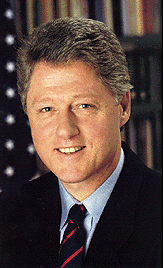

Fast Fact: William Clinton promised a brighter tomorrow and focused on the national economy.
Biography: William J. Clinton, at 46 the youngest man elected President since John F. Kennedy, came to the White House pledging to end the era of drift and deadlock and begin a new season of American renewal. In an address before Congress on the 29th day of his Presidency, he outlined a bold strategy to lift the economy through increased public and private investment while cutting $500 billion from the Federal deficit.
The next day he began promoting his "new direction" to the people through television appearances and rallies, thus by-passing entrenched special interests in Washington. The tactic was a reprise of his successful campaign, using modern communications to brush aside Democratic challengers and best a Republican incumbent.
President Clinton was born William Jefferson Blythe IV on August 19, 1946, in Hope, Arkansas, three months after his father died in a traffic accident. When he was four years old, his mother wed Roger Clinton of Hot Springs, Arkansas. In high school young William took the family name.
He excelled as a student and as a saxophone player. Frequently during his political career he has delighted listeners with an impromptu session on the sax. As a delegate to Boys Nation while in high school, he met President Kennedy in the White House Rose Garden. The encounter inspired him to enter a life of public service.
Clinton attended Georgetown University and in 1968 received a bachelor's degree in foreign service. A Rhodes Scholar, he studied at Oxford University for two years. He received a law degree from Yale University in 1973, then returned to Arkansas to teach law at the University of Arkansas and to prepare to enter politics.
He was defeated in his campaign for Congress in Arkansas' Third District in 1974. The next year he married Hillary Rodham, a Wellesley College graduate. He had met her while they both were studying law at Yale. Their marriage formed a strong personal and political partnership of talented equals that would give added dimension to the Clinton Presidency. It also expanded the Clintons' household; in 1980, their daughter, Chelsea, was born.
Clinton was elected Arkansas attorney general in 1976, then went on to win the governorship in 1978. He lost in his try for a second term,. but he regained the office four years later and served as governor until 1992. That year Clinton defeated George Bush and third-party candidate Ross Perot for the Presidency.
Clinton and his running mate, Tennessee's Senator Albert Gore, Jr., then 44, represented a new generation in American political leadership. For the first time in 12 years both the White House and Congress were held by the same party.
In domestic affairs, Clinton signed into law measures to revitalize the economy and renew the American community. To boost living standards and create jobs, he won Congressional approval of a massive deficit reduction plan, a barrier-breaking trade agreement with Mexico, aid to Russia, and tax cuts for small businesses and the working poor. He also signed the Brady Bill, which required a waiting period for gun purchases.
Other initiatives included the national service law to put Americans to work restoring their communities; the Family and Medical Leave Act to protect the jobs of parents who must care for sick children; reform of public education with the adoption of his GOALS 2000 bill; a new national health care plan and welfare reform; and a get-tough program against crime and violence.
The recovering U. S. economy and a tour of Europe ending in a Moscow summit buoyed Clinton's leadership at the end of his first year. In his 1994 State of the Union Address he declared that the Nation "is growing stronger, but it must be stronger still."


